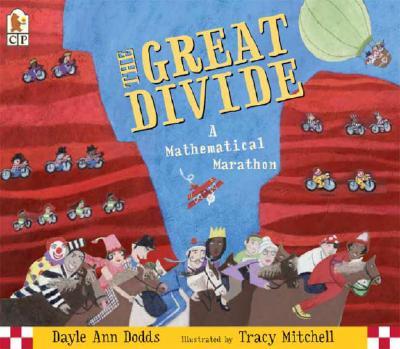
The Great Divide: A mathematical marathon
Strand
Number
Mental Strategies
Maths Concepts
Australian Curriculum: Description
This book contextualises division using a cycling marathon. Students can mentally calculate how many racers are left after each mishap then check as they turn the pages.
Teaching ideas
(1) Have students develop their own context/idea/story for division, have them see if their elbow partner can mentally calculate the correct answer; (2) Have students use numbers and symbols to represent the number sentences in the story

Alex’s Adventures in Numberland
Maths Concepts
Australian Curriculum: Description
A book “reclaiming maths from the geeks”. The author explores the mathematical ideas that underpin almost every facet of our lives. He travels the world meeting the fastest human calculators and a numerate chimpanzee in Japan. Snippets of amazing mathematics in the real world and proofs that will have you rapt.
Teaching ideas
Hooks for lessons. Introduction to new topics. Interesting 'starters' for lessons. Ideas to showcase mathematics or numeracy at subject evenings, open days, learning fairs etc.
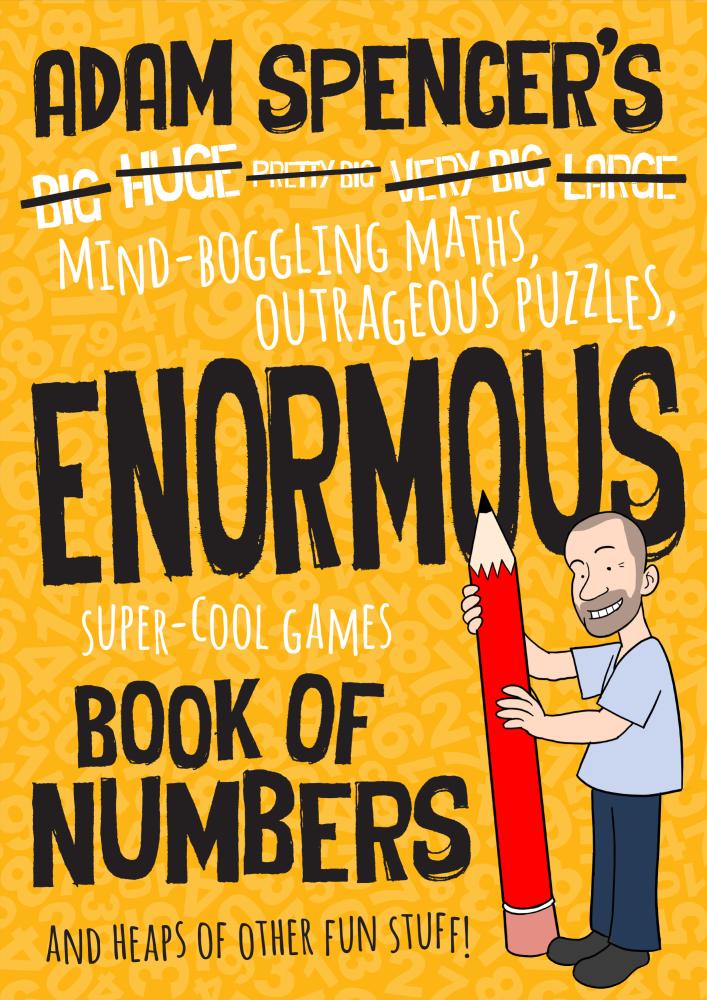
Adam Spencer’s Mind-Boggling Maths, Outrageous Puzzles, Enormous Super-Cool Games Book of Numbers and heaps of other fun stuff!
Strand
Algebra
Australian Curriculum Year Level
Year 2, Year 3, Year 8, Year 4, Year 5, Foundation Year, Year 6, Year 1, Year 7, Year 9
Multiplication and Division Triangle, Part-Part-Whole, Find the Pattern, Benchmarking, Draw what you can't see
Australian Curriculum: Description
Prep-Sort, describe and name familiar two-dimensional shapes and three-dimensional objects in the environment (ACMMG009); YR1-Recognise and classify familiar two-dimensional shapes and three-dimensional objects using obvious features (ACMMG022); YR2-Describe the features of three-dimensional objects (ACMMG043); YR3-Identify symmetry in the environment (ACMMG066); YR4-Investigate number sequences involving multiples of 3, 4, 6, 7, 8, and 9 (ACMNA074); YR5-Use efficient mental and written strategies and apply appropriate digital technologies to solve problems (ACMNA291); YR6-Construct simple prisms and pyramids (ACMMG140); YR7-Draw different views of prisms and solids formed from combinations of prisms (ACMMG161); YR8-Solve a range of problems involving rates and ratios, with and without digital technologies (ACMNA188); YR9-Express numbers in scientific notation (ACMNA210)
Teaching ideas
Real-world application in this book. Cross-curricular links are strong too, science, humanities, music, HPE etc

Sir Cumference and the Great Knight of Angleland
Strand
Space
See the Parts to match the whole
Maths Concepts
Australian Curriculum: Description
4-Compare angles and classify them as equal to, greater than, or less than, a right angle (ACMMG089); 5-Estimate, measure and compare angles using degrees. Construct angles using a protractor (ACMMG112); 6-Investigate, with and without digital technologies, angles on a straight line, angles at a point and vertically opposite angles. Use results to find unknown angles (ACMMG141)
Teaching ideas
Identifying, classifying and drawing angle. Games like acute-right-straight-obtuse (rock-paper-scissors)
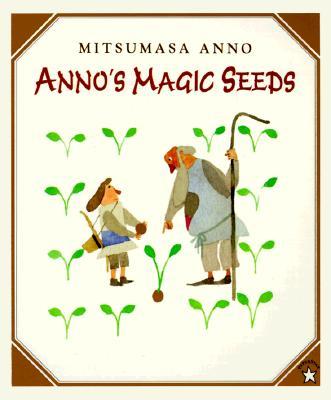
Anno’s Magic Seeds
Australian Curriculum: Description
Solve word problems by using number sentences involving multiplication or division where there is no remainder (ACMNA082); Find unknown quantities in number sentences involving addition and subtraction and identify equivalent number sentences involving addition and subtraction (ACMNA083)
Teaching ideas
Explore other patterns such as square numbers, triangular numbers, Fibonacci sequence etc.
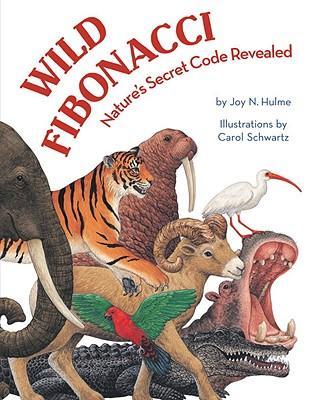
Wild Fibonacci: Nature’s Secret Code Revealed
Strand
Algebra
Maths Concepts
Australian Curriculum: Description
Describe, continue, and create number patterns resulting from performing addition or subtraction (ACMNA060); 4-Find unknown quantities in number sentences involving addition and subtraction and identify equivalent number sentences involving addition and subtraction (ACMNA083)
Teaching ideas
Puzzle collaboration to create some summary notes for the maths workbook. Like the clip titled Fibonacci Numbers: Identifying Patterns on Teaching Channel
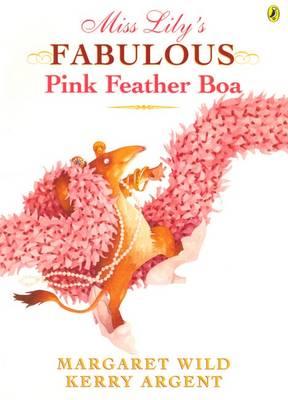
Miss Lily’s Fabulous Pink Feather Boa
Strand
Measurement
Benchmarking
Maths Concepts
Australian Curriculum: Description
Identify questions or issues for categorical variables. Identify data sources and plan methods of data collection and recording (ACMSP068); Collect data, organise into categories and create displays using lists, tables, picture graphs and simple column graphs, with and without the use of digital technologies (ACMSP069); 4-Use simple scales, legends and directions to interpret information contained in basic maps (ACMMG090); 4-Construct suitable data displays, with and without the use of digital technologies, from given or collected data. Include tables, column graphs and picture graphs where one picture can represent many data values (ACMSP096); 4-Evaluate the effectiveness of different displays in illustrating data features including variability (ACMSP097); 5-Construct displays, including column graphs, dot plots and tables, appropriate for data type, with and without the use of digital technologies (ACMSP119)
Teaching ideas
Information poster on an Australian animal depicted in the book; - Scientific Name - Description - Location (map and description) - Habitat - Diet - Status (Endangered/Not Endangered) - Life Cycle - Data/statistics - Other interesting facts - Pictures/illustrations; or a trifold brochure with the above. With or without the use of technology.
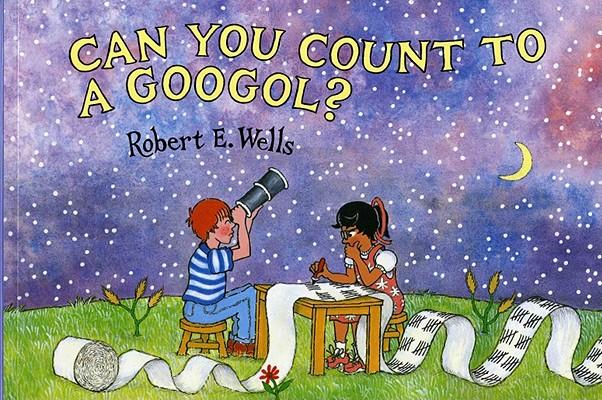
Can you count to a googol?
Strand
Number
Maths Concepts
Australian Curriculum: Description
Recognise, model, represent and order numbers to at least 10 000 (ACMNA052); Apply place value to partition, rearrange and regroup numbers to at least 10 000 to assist calculations and solve problems (ACMNA053); 4-Recognise, represent and order numbers to at least tens of thousands (ACMNA072); Apply place value to partition, rearrange and regroup numbers to at least tens of thousands to assist calculations and solve problems (ACMNA073); 7-Investigate index notation and represent whole numbers as products of powers of prime numbers (ACMNA149)
Teaching ideas
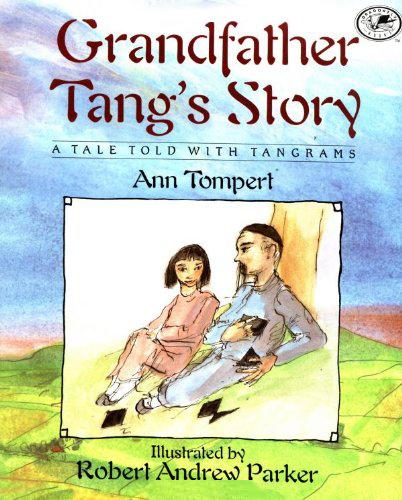
Grandfather Tang’s Story: A tale told with tangrams
Strand
Space
Australian Curriculum: Description
ACMMG009; ACMMG010; ACMMG022; ACMMG042; ACMMG064; ACMMG088; ACMMG089; ACMMG091; ACMMG112; ACMMG113; ACMMG141; ACMMG142; ACMMG165; ACMMG166
Teaching ideas
Constructing tangrams, barrier games, jigsaws, tangram teasers, exploring triangles, oblongs, parallelograms, trapeziums, areas, polygons, hexagons, angles
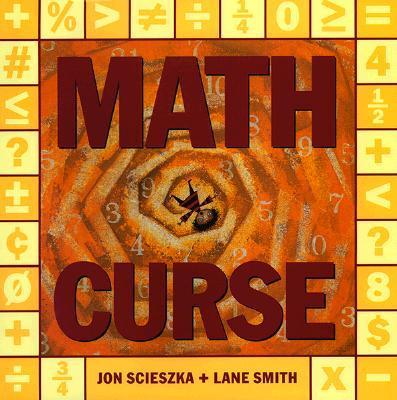
Maths Curse
Strand
Measurement
Maths Concepts
Australian Curriculum: Description
3-Tell time to the minute and investigate the relationship between units of time (ACMMG062); 4-Investigate equivalent fractions used in contexts (ACMNA077); 5-Choose appropriate units of measurement for length, area, volume, capacity and mass; 6-Continue and create sequences involving whole numbers, fractions and decimals. Describe the rule used to create the sequence (ACMNA133)
